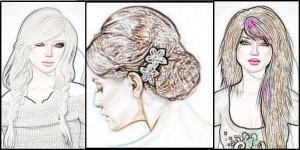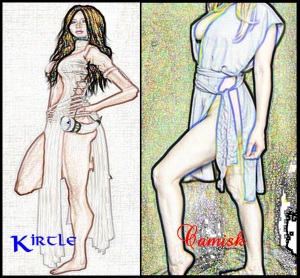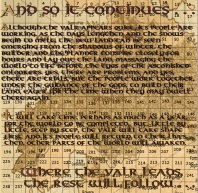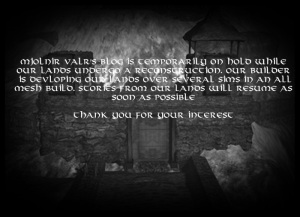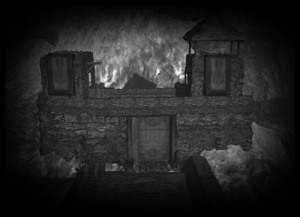The woman took the knife and chopping board over to the sink and dropped them in to tidy up later. She crossed to the window and looked out. Where was that girl? She was supposed to be playing outside the door. She went to said door and opened it, calling, “Ikuma! Ikuma, where are you? Come back here!” She waited a few moments and was about to step outside to go and search when a small bundle of fiery fury erupted round the corner and crashed full tilt into her legs, burying a tear-stained face in her mother’s skirt. The woman recovered her balance and squatted to the child’s level, taking her by the shoulders to look at her.
“Ika, whatever’s the matter?” she asked, wiping the child’s tears with a corner of her apron.
“M-m-mean.Th-those g-girls,” came the words through the sobs.
The woman drew her daughter close and hugged her. “Let’s go inside and get you some milk and one of the honey cakes I just made, and you can tell me about it. How does that sound?” The girl’s big, coal-black eyes looked up at her mother and she nodded solemnly.
The woman took her daughter’s hand and led her up the steps. The single room in the slums of Hochberg had been their home for seven years now, and the girl and her brother had known no other, having been born there not long after their mother’s arrival. The child climbed to a seat at the table and the woman brought the drink and cake and sat down beside her. “So, Ika. What have the mean girls been saying this time?” she asked gently, brushing the girl’s errant black hair from her eyes with her fingertips.
The child bit into the bun and looked at her mother sadly. “They make fun of me.”
“Oh? And why is that?”
The girl’s cheeks reddened and she stared at her lap. “My clothes,” she whispered. “Because I don’t dress like they do.”
Her mother sighed. Gently, she put her fingers at the tip of the child’s chin and tilted her head to look at her face and so she, in turn, could see her mother’s. “And do you know why you don’t dress as they do, Ika?” she asks patiently.
Ikuma shook her head, sniffing back a sob. “No, ma. I only know we’re different.”
“Yes, Ika, we are. We are from Torvaldsland, and we are proud to be so. You must never forget that. We dress the way women do there, not like these soft excuses for women from the south that live here.”
“What do you mean, ma?” The girl took a drink of her milk and wiped her mouth on her sleeve.
The woman frowned. Now was as good a time as any for a lesson, she supposed. “Let me get something, and then I’ll tell you,” She rose and crossed to a cupboard, opening a drawer and taking out a sheaf of papers which she brought back with her to the table. There were sketches on the pages and she spread them out on the surface. She picked one of them up.
“This,” she explained, “is how women of our lands dress.” The drawing on the paper showed a dress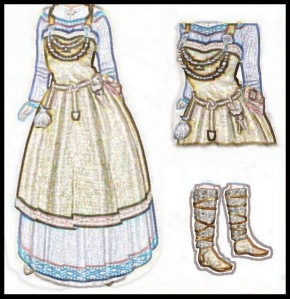 woven of wool cloth that would cover from neck to ankle. Over it was an apron-like tunic edge with embroidery in a simple repeated design. Around the waist was a belt from which hung a set of keys, a drinking horn, a small pouch and a purse. A mjolnir, a replica of Thor’s hammer, dangled from a set of northern beads that were attached to the dress near the top. Stout, flat-heeled, leather boots and furred leggings, were pictured beside the gown, as an example of the best footwear for the mountainous and often snowy region.
woven of wool cloth that would cover from neck to ankle. Over it was an apron-like tunic edge with embroidery in a simple repeated design. Around the waist was a belt from which hung a set of keys, a drinking horn, a small pouch and a purse. A mjolnir, a replica of Thor’s hammer, dangled from a set of northern beads that were attached to the dress near the top. Stout, flat-heeled, leather boots and furred leggings, were pictured beside the gown, as an example of the best footwear for the mountainous and often snowy region.
“But it’s so drab, ma!” Ikuma objected.
Her mother slapped her playfully and laughed. “Are you saying I’m dull, girl?” she teased.
The child giggled. “No, ma, but you know what I mean. The ladies here wear such bright, soft clothes. They look really pretty.”
The woman regarded her seriously. “The women of the south are lazy and feckless, most of them. They’d not know a good days work if it jumped up and bit their arse. We dress for what we do, and most of the time our women work in the fields and look after the animals so our hall can be fed and our community will survive the winter. We have no need for fripperies. Remember that, Ika, and be proud of your heritage.”
“But, ma” the child argued, “I was born here. I’ve never been where you’re talking about.”
Her mother gave her one of the looks that let the girl know she’d best say no more, and the girl bit her cake in silence, though her coal-black eyes smouldered. She had her mother’s temper, for sure, and lived up to her name – Ikuma, ‘fire’ in the tongue of her father. “The thing is, Ika, one day you will. And when that day comes you’d better know the right way to dress and behave. Home is not like here, where women seem to do as they please. There are ways to behave and you will learn them, for your own good, just as the Smith is teaching your brother the ways of men.”
“He scares me sometimes,”grumbled the girl. “He used play and be nice, but he’s changed.”
Her mother raised a brow and looked at the girl. “The Smith? No, Ika, he’s not changed, you have. You’re older now and it’s right he doesn’t play the games of a child with you now. And you’re right to be wary of him, as you should all men, but especially those of our land, for they won’t let you be lax. The Smith is trying to prepare you for what will come, just as he’s teaching Sikuk to be a man. He’s been good to us, and you must never forget that. We owe him much.”
“But -” the girl began and was stopped by her mother’s raised hand.
How different they are, the woman thought as she looked at her daughter, and just as Ikuma is fiery, so Sikuk grows more icy with each day the Smith and the Rarius train him to fight. Soon, it 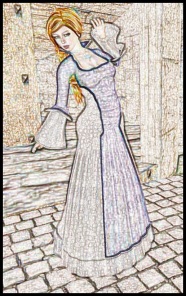 will be time for him to leave as a man. She sighs and picks up another picture, showing a woman in a long gown, but this time the neckline was cut low, exposing her cleavage. She passed the picture to the girl.
will be time for him to leave as a man. She sighs and picks up another picture, showing a woman in a long gown, but this time the neckline was cut low, exposing her cleavage. She passed the picture to the girl.
“You may have seen women here dressed so,” she said, “but remember this. When we go home, and we will, dressing in this way will get you a collar as sure as the sun rises in the morning.” And probably at your brother’s hand, she thought to herself. She pushed the picture towards her daughter and chose another. “Look at the hair of these women and tell me which you think this is acceptable.”
The child drew the picture to her. There were three women on the picture; one had her hair tied in braids, the second’s was piled on her head and fastened in place with combs and the third’s tumbled around her shoulders, loose. The girl studied the pictures, looking from them to her mother. Her eyes fell onto the tips of her own braids. “Well,” – she drew the word out – “I have braids, and you have yours tied up, so I’d guess those were acceptable, and the bond has her hair loose.”
Her mother smiled. “You’re wily as a lart,” she said, “and you’re right, but do you know why?” She saw the girl’s brow furrow, followed by a shake of her head. “Well, any woman who is not mated has her hair braided. Once she is claimed by a man, she must wear her hair fastened up, and her mate provides the combs for her to do this. The richer he is, the more ornate and numerous the combs.”
The girl’s innocent face studied her mother’s, thought almost visible behind the dark eyes. The woman had seen this look before and braced herself for the question. “Ma? Did you get many combs from father?”
The woman’s eyes misted and her aspect became sad. “Beautiful ones,” she said, her mind far away in the past. She fell silent, lost in her thoughts.
The child watched for a moment, debating the next question. “Is he dead, ma?” she asked eventually.
The woman refocused on the girl and stroked her hair. “He will find us. One day. He will come.” She kissed her daughter’s head and cleared her throat. “And when he does, he will want you dressed properly, so . . .” she pushed another picture forward “. . . tell me if this is right for our lands.” The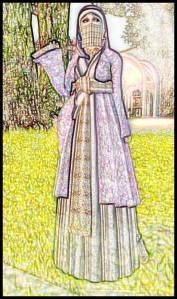 picture showed a woman in southern robes of concealment, covered from head to toe and wearing the nine veils. The girl laughed loudly.
picture showed a woman in southern robes of concealment, covered from head to toe and wearing the nine veils. The girl laughed loudly.
“No, ma.” Her tone was derisory. “I’ve seen these women in the city. The Smith calls them -”
“We don’t need to know what the Smith calls them, thank you, Ikuma.”
“Sorry, Ma. No, women don’t dress like that in our land.”
The woman smiled, pleased at her response for many reasons. “What do you know of bonds, Ika?” she asked.
“Ooh, I like the Smith’s bond. She’s fun and chatty. Not like a kajira. They’re soppy.”
Her mother raised an eyebrow. “I shall have to watch more closely where you play, I can see.”
“Aww, ma, I only talk to her when Larma’s there.” There was a clatter from the corner of the room where the household bond had dropped the small hand-loom she’d been working with and was scrambling to retrieve it. The woman gave her a look that said she would be spoken to later and turned back to the girl.
“What does a bond wear that makes her different from a kajira?”
The girl thought a moment. “A kirtle made of undyed wool,” came the answer, “if her Jarl allows it, but nothing inside the hall.” She smiled proudly.
The woman smiled back, and gave a nod of approval in the direction of the bond, now quietly weaving again. “So, are you clear now why you must dress this way, Ika?”
Big, dark, solemn eyes stared up at her and a small head nodded. “Yes, ma.”
“And when these southern girls make fun of you again, what will you say to them?”
The same solemn eyes looked back. “I’ll tell them they can go and suck Odin’s hairy balls, ma.”
“Ika!”

